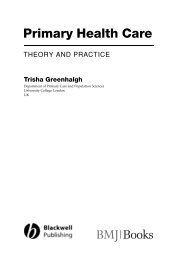DOING BUSINESS 2009 - JOHN J. HADDAD, Ph.D.
DOING BUSINESS 2009 - JOHN J. HADDAD, Ph.D.
DOING BUSINESS 2009 - JOHN J. HADDAD, Ph.D.
Create successful ePaper yourself
Turn your PDF publications into a flip-book with our unique Google optimized e-Paper software.
46 Doing Business <strong>2009</strong>ECDhighcomeECDhighcomeatabase.FIGURE 9.3Madagascar speeds importsTime to import (days)50403020100Documents Port Customs TransportProceduresSource: Doing Business database.Time cut from49 days to 27agementFIGURE 9.2system. Uruguay completed itsRankings on trading across bordersautomated are based on customs 3 subindicators system. Now traderscan All documents send documents required to Document customs preparation, fromtheir by customs own and office. Brazil customs introduced clearance andother agenciestechnical control, portselectronic manifest system, and terminal allowing handling, customsclearance to begin beforeinlandthetransport33.3% 33.3%cargoand handlingarrives. Documents Time toto export exportIn and East import Asia and import Pacific, Korea andThailand carried out the most comprehensivereforms.33.3%Both introducedCost to exportinternet-based and import electronic data interchangesystems and online issuance oftrade documents. US$ per 20-foot container, Traders can submitno bribes or tariffs includedcustoms declarations from anywhere.Note: See Data notes for details.Singapore, already the leader in tradeFIGURE facilitation, 9.5 is going a step further. It isTop upgrading 5 reform its features system to in a trading 3-dimensionalacross borderstrade platform allowing traders to interfacewith government agencies as well asReforms including feature since DB2006 (%)45%local and international businesses.Introduced or improved electronicdata interchange In Indonesia system a single window startedoperating in December 2007 in the port38%of Jakarta. The <strong>Ph</strong>ilippines introducedImproved customs administrationnew scanners, reducing the level of physicalinspection at the ports. 35% In addition,Introduced traders can risk submit management customs techniques declarationselectronically through value added serviceproviders. In Palau 29% and Tonga traderscan port file procedures customs or declarations infrastructureon aImprovedUSB drive. Customs no longer needs to14%reenter the data, saving time.Introduced border cooperation agreementsIn the Middle East and North Africa,Note: A reform may include several reform features.Source: Doing Business database.20072008Egypt continued to reform. It now allowscustoms clearance on companies’ premises.It also monitors the performance ofborder agencies to enhance service delivery.Djibouti cut the documents requiredto trade from 8 to 5. Saudi Arabia cutport fees by 50%. Morocco is bringing togetherdifferent border agencies througha port community network to speed theclearance of goods.Eastern Europe and Central Asiakept up the pace of reform. Georgiaimplemented a risk management system,reducing the share of merchandiseinspected to 10%. Belarus introducedlegislative changes that cut the maximumtime allowed for customs clearance from10 days to 1. The former Yugoslav Republicof Macedonia purchased 4 mobilescanners, reducing the number of physicalinspections carried out.OECD high-income economies alsocarried out reforms. In France traderscan now submit documents electronically.Fast-track clearance procedureswere also put into place. Belgium introduceda paperless customs clearancesystem. Denmark improved its onlinecustoms system. In Austria it is now possibleto use an electronic letter of credit.Reforms in some countries madethings more complicated. In EquatorialGuinea traders used to take their consignmentsfrom the ports while completingcustoms formalities. This is no longerpossible. In Burkina Faso the thresholdvalue triggering inspections has beenlowered, even though prices are on therise. Now more consignments need to beinspected, slowing the process. The Gambiareinstated compulsory scanning fees.Traders complain that they have to paythe scanning fee even when their cargois not scanned.What are the reform trends?The number of economies implementingnew reforms to facilitate trade hasbeen on the increase globally. In 2005there were 25 reformers. In 2007/08there were 34. Africa increasingly tookthe lead (figure 9.4). In 2005, 5 Africaneconomies reformed. In 2007/08, 11 did.Ghana, Kenya, Mauritius, Rwanda andTanzania reformed in multiple years.In the Middle East and North Africaon average, 4 economies reformed eachyear. In Latin America and the Caribbeanreforms ranged from 3 to 8.Speeding clearanceThe most popular reform feature in facilitatingtrade has been to implementan electronic data interchange system(figure 9.5). Electronic transmission ofdocuments not only speeds the clearanceof goods; it often reduces the possibilitiesfor paying bribes. “There is anold saying—don’t pay me a salary, put mein customs,” remarks a Honduran freightforwarder. That changed with the adventof electronic data processing. But to avoida dual electronic and manual customsclearance process, the new systems mustbe complemented by supporting legislationauthorizing electronic transactions.Economies implementing an electronicdata interchange system saw thetime to clear goods cut by 3 days onaverage. The reform also helps increasepredictability in clearance times. BeforePakistan implemented its electronic system,only 4.3% of goods were clearedwithin a day; for a quarter of the goods,clearance took a week. Now 93% of goodsare cleared within a day. 6Where electronic data interchangesystems are in place, it is easier to applyrisk management to customs clearance,another popular reform. Thirteen economies,including Colombia, Madagascarand Mongolia, have introduced riskbasedinspections alongside electronictransmission of documents. In economiesthat use risk-based inspections,19% of containers are inspected on average;in economies that do not, 53% are.Looking beyond customsWhile customs reform remains most importantto trading across borders, severalother reforms also play a part. Indeed,in the Doing Business sample, customsclearance accounts for less than 20%of the time to export, from the time(c) The International Bank for Reconstruction and Development / The World Bank
















